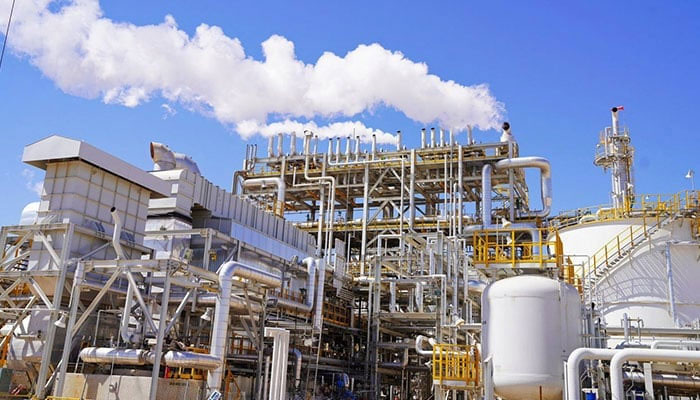Refining sector seeks SIFC intervention
KARACHI: The refining sector has reached out to the Special Investment Facilitation Council (SIFC) seeking intervention to mitigate the adverse impacts of recent amendments in sales tax, envisaging exemptions for petroleum products from the levy of sales tax, The News learnt on Monday.
Sources within the oil sector disclosed that refineries have engaged with high-ranking officials and are scheduled for meetings in the coming days to safeguard their operations and future investments in upgradation agreements.
They emphasized that refineries are contemplating abstaining from signing the upgradation agreements unless the government reconsiders its decision to exempt petroleum products from sales tax, as outlined in the current fiscal year's finance bill.
The deadline for signing these agreements has been recently extended, allowing refineries flexibility in timing. However, sources noted that given the current taxation measures, refineries cannot proceed with these agreements without risking substantial investment losses, estimated at $4-5 billion should all refineries opt for upgrades.
Last week, in a joint letter to the government, the country’s five refineries expressed concern that the inability to reclaim significant portions of input sales tax on taxable purchases and services would severely impact their financial viability.
With regulated selling prices for most products, refineries would be unable to pass on increased costs to consumers, adding that the cumulative effect of these tax proposals would render refinery operations unsustainable.
The recent introduction of the Pakistan Refining Policy for Upgradation of Existing/Brownfield Refineries 2023 aims to incentivize significant investments in the sector within specified timelines. Refineries are currently undertaking upgrade and expansion projects totalling $4.5 billion, which are expected to contribute substantially to the economy through import substitution and employment generation.
However, concerns were raised that the inability to claim input tax credits on project-related imports and purchases under current tax policies would escalate project costs, rendering them economically unfeasible, as stated in the joint letter.
Sources close to the matter indicated that approaching the SIFC is viewed as a final recourse to secure the future of refineries and their planned investments, pending the signing of agreements with the Oil & Gas Regulatory Authority (Ogra).
-
 Kate Middleton, Prince William Share Message Ahead Of Major Clash
Kate Middleton, Prince William Share Message Ahead Of Major Clash -
 Is Dark Matter Real? New Theory Proposes It Could Be Gravity Behaving Strangely
Is Dark Matter Real? New Theory Proposes It Could Be Gravity Behaving Strangely -
 Viral AI Caricature Trend: Is Your Personal Data Really Safe?
Viral AI Caricature Trend: Is Your Personal Data Really Safe? -
 Lil Jon’s Late Son, Nathan Smith Spoke Highly Of His Father Before His Tragic Death
Lil Jon’s Late Son, Nathan Smith Spoke Highly Of His Father Before His Tragic Death -
 China Boosts Reusable Spacecraft Capabilities By Launching For The Fourth Time
China Boosts Reusable Spacecraft Capabilities By Launching For The Fourth Time -
 Bianca Censori On Achieving 'visibility Without Speech': 'I Don't Want To Brag'
Bianca Censori On Achieving 'visibility Without Speech': 'I Don't Want To Brag' -
 'Concerned' Prince Harry Future Plans For Lilibet, Archie Exposed
'Concerned' Prince Harry Future Plans For Lilibet, Archie Exposed -
 Skipping Breakfast? Here Are Some Reasons Why You Shouldn't
Skipping Breakfast? Here Are Some Reasons Why You Shouldn't -
 Billie Eilish Slammed For Making Political Speech At Grammys
Billie Eilish Slammed For Making Political Speech At Grammys -
 Beverley Callard Announces Her Cancer Diagnosis: 'Quite Nervous'
Beverley Callard Announces Her Cancer Diagnosis: 'Quite Nervous' -
 WhatsApp May Add Instagram Style Close Friends For Status Updates
WhatsApp May Add Instagram Style Close Friends For Status Updates -
 Winter Olympics Officially Open In Milan, Cortina With Historic Dual Cauldron Lighting
Winter Olympics Officially Open In Milan, Cortina With Historic Dual Cauldron Lighting -
 Sciences Reveals Shocking Body Response Against Heart Attack
Sciences Reveals Shocking Body Response Against Heart Attack -
 Who Is Charlie Puth? Inside Awards, Hits & Journey Of Super Bowl Anthem Singer
Who Is Charlie Puth? Inside Awards, Hits & Journey Of Super Bowl Anthem Singer -
 Jared Leto 'swings For The Fences' In 'Master Of The Universe'?
Jared Leto 'swings For The Fences' In 'Master Of The Universe'? -
 Kelsea Ballerini, Chase Stokes Not On Same Page About Third Split: Deets
Kelsea Ballerini, Chase Stokes Not On Same Page About Third Split: Deets




